Photo
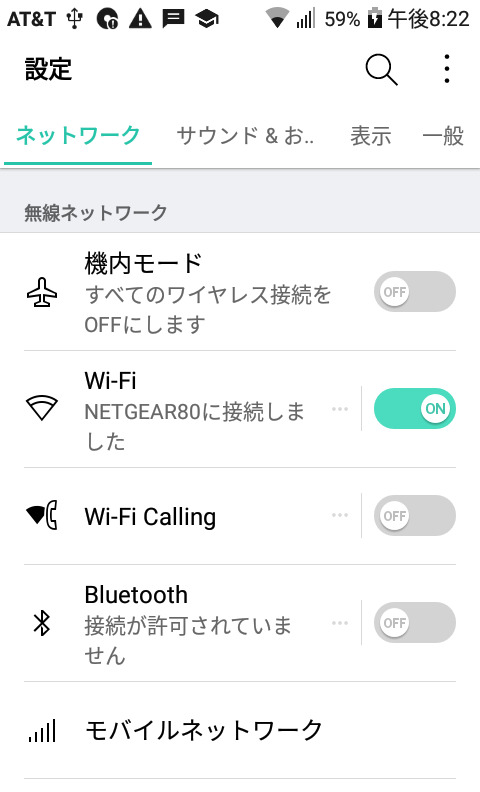
I changed my phone to japanese for the challenge today!
challenge by therealpolygot
2 notes
·
View notes
Text
hey, sorry i havent been posting recently! ive been really busy w various things
since its artfight season, i think im gonna take a break from my langblr a bit until its over so i dont burn myself out
see y'all then!
1 note
·
View note
Photo
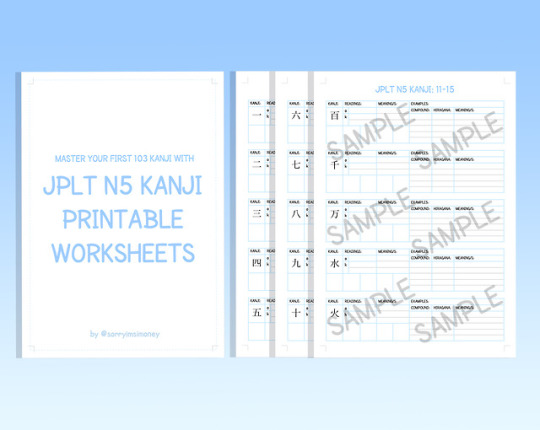
finally learnt my first 103 kanji using these worksheets!
now that i am finished with JPLT N5 kanji i can move onto JPLT N4 kanji! wish me luck!
if you want to download these sheets for yourself here’s the link: https://www.etsy.com/au/listing/619889025/jplt-n5-kanji-printable-worksheets?utm_medium=SellerListingTools&utm_campaign=Share&utm_source=Raw&share_time=1528531198000&utm_term=so.slt
happy studying!
132 notes
·
View notes
Photo
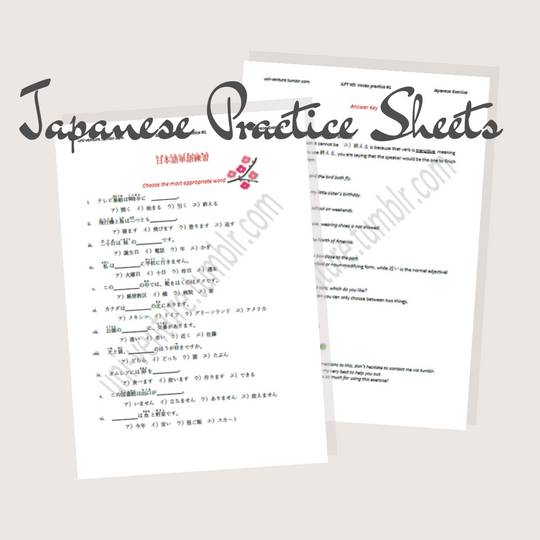
Would you look at this, two (2) different practice printables for N5 vocab! (Hey, @pika-pii, I believe you asked? I hope this helps!)
☑ Proofed by native speakers (please do still contact me if you have corrections!)
☑ 11 questions and answers (2 A4 pages total) for some light practice
☑ Multiple choice
☑ Totally free in every way!
Download here.
more like this | my posts | buy me a coffee | let me know how you do!
471 notes
·
View notes
Text
How To: Understand and Play Video Games in Japanese
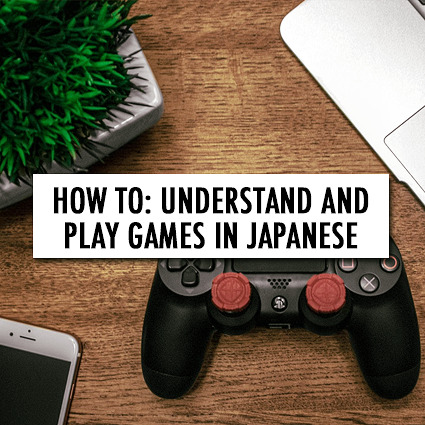
The best way to learn a language is to immerse yourself in it. That can be tricky when you’re not living in a country where they speak the language you want to hear. In this post I’ll be showing you how you can study Japanese using video games - and learn while having fun!
Step 1: Choose your Game

The first step is to choose the game you want to play in Japanese. Be realistic - can you access the Japanese copy of this game? Is your console region-free? Can you change the language settings on your console to Japanese? Most importantly, can you locate the Japanese script online? … That leads us to step two.
Step 2: Locate the Japanese Script
Locating the Japanese script can be easy if it’s a popular game. A simple google of ‘[Title] Japanese Script’ can normally bring up the result you want. Usually the script will only contain character’s spoken text, and not include information such as menu items and options. You may need to research this vocabulary separately through playing the game or observing screenshots. A list of popular RPG titles and Japanese subtitles can be found on this reddit thread and KanjiKoohii here.
Step 3: Text Mining with User Local
Website link: [Here]
UserLocal is an incredible website that analyses text for you. You can input a massive amount of text, and in a few seconds you will have downloadable, analysed data. The best part is… it’s free! Paste your whole game script into the box as detailed below and click ‘テキストマイニングする’.

Step 4: Utilize the Data
Once UserLocal has analysed your text, it provides a bunch of useful charts and data for you to browse and utilize. First, it provides a spider-web graph which shows the relationship between vocabulary used in the game. Second is a word cloud of the most-used vocabulary words. I have anaylsed ‘Final Fantasy X’, and below you can see that the most used words are character names ‘ ’ユウナ’ (Yuna) ‘ティーダ’ (Tidus), and so on. THIS is the document you want to download by pressing the green button next to ‘ワードクラウド’.
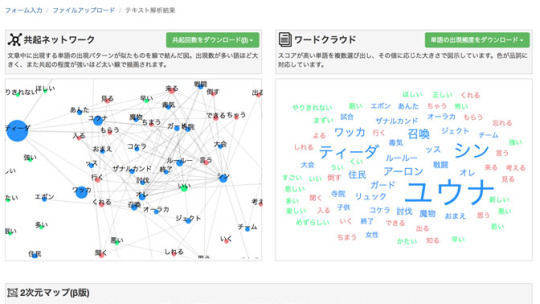
The website organizes vocabulary into Nouns, Verbs and Adjectives, whilst showing the amount of times the vocabulary is used. You may find that you recognise a lot of the commonly used verbs, ‘する, ‘くる’ ’思う’ and so on. However, in order to progress through the game in Japanese it’s the less-frequently used vocabulary that you have to study!
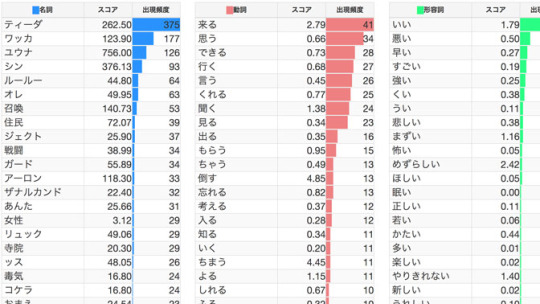
Step 5: Figure out What You Need to Know
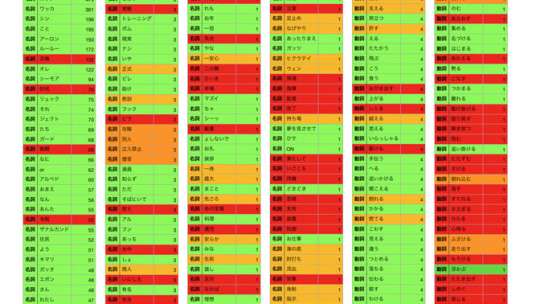
On downloading the data, I open it with Numbers (Mac OS) or Excel (Windows OS). I then go through the list and highlight what words I know and can read with ease (Green), words that I think I know but I’m not 100% (orange), and words I can’t read or I’ve never seen before (Red). Some of the most frequently used words in games aren’t words you’ll often see in daily Japanese, ‘召喚’ for example means ‘summon’ and is used when talking about summoner spirits in Final Fantasy… despite not being used often in daily life, it is in the top 10 nouns of the Final Fantasy X script, so I gotta know it!
Step 6: Learn your Vocabulary!
You will need a good concept of grammar to understand the game, however if you’re looking to play a whole game in Japanese I have to assume you already have your grammar down! The main step is learning the vocabulary, which you can do using SRS software such as Anki.
Step 7: Play your game!
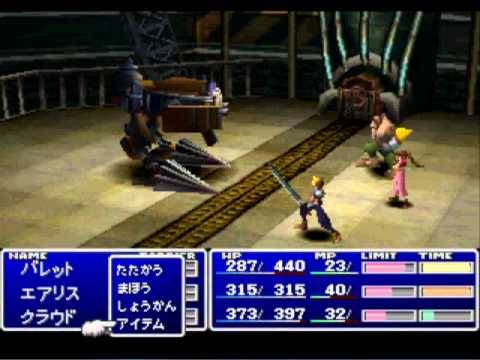
I don’t recommend starting to play the game until you have the vocabulary memorized. Nothing is more soul-destroying than thinking your Japanese is incredible, only to play a game or watch a film for 2 minutes before realising you know nothing! Remember: this isn’t necessarily an indication of your ability, it just may be that your video game has very specific vocabulary!
Step 8: Enjoy Learning while Having Fun!
That’s it! You can also apply this method to movies, anime, and any other material you can get an online script for.
2K notes
·
View notes
Text
Topics to write about in your target language(s)
These are for a range of different levels so do what you can!
Introduce yourself. Talk about your birthday, hobbies, languages you speak, etc.
Create characters and introduce them
Talk about your favourite book/book series. Why do you like it?
Favourite movie?
Favourite animal(s)?
Least favourite animal(s)?
What’s the weather like outside? What was it like yesterday? What do you hope it’ll be like tomorrow?
Describe your favourite colour without using the word
Talk about a childhood memory
Talk about a family member
Describe your pet/a pet you want
Where do you see yourself in the next year? next 5 years? next 10?
Describe your dream date
Complain about something that’s been bugging you lately
Talk about your day
Write a letter to anyone. Your mom, your friend, a stranger you saw on the train
Write a poem
Write about anything but the first letter of each sentence has to spell a word
Write what you need to do in the next week, month, year
Talk about your favourite food
What was your favourite story you read as a kid? Who read it to you?
Why did you start learning your target language(s)?
What language(s) would you like to learn in the future?
Talk about a dream you had
Pretend you’re at a restaurant. What type of conversations will you have there?
What’s something you’d never tell anyone? Why would you never tell anyone?
Your pet suddenly got the ability to talk. What do they say to you?
You’ve woken up somewhere you’ve never been before. Describe what it looks like
What do you want to do in the future?
Dream trip?
Do you want kids? Why or why not?
Translate a conversation you had with someone
Talk about your favourite weather
Favourite season?
Pretend you’re telling your childhood stuffed animal something
Write a to-do list
Talk about your favourite plant(s)
Write about something funny that happened to you or someone you know
Write about a time you were scared
A time when you were happy
Sad
Angry
Miserable
Give a summary of different books/movies you’ve read/watched
Write about your favourite teacher. Why did you like them?
What’s your favourite meal? Who makes it?
What’s your dream job? It doesn’t have to be realistic
What names do you like. Why?
Write about one of your fears
What motivates you to learn your target language(s)?
4K notes
·
View notes
Text
Devoicing in Japanese
Okay, so full disclaimer here: this is gonna be a kind of difficult post to make without any Native Audio recordings to explain this, since this is an explanation of phonetics. Bear with me though, cause this is something that can boost your Japanese accent a LOT, with relatively little effort. Also, there’s gonna be a fair amount of explanation here cause I have to teach you some words about how your voice works and stuff.
So what exactly *is* devoicing? It’s probably actually easier to explain voicing first, so I can get to explaining what devoicing.
Voicing
is basically just a fancy linguistics term for moving your vocal cords when you make a sound; try holding your fingers against your throat when you say “aaaa”. Do you feel it vibrating? Those are your vocal cords making sound. Try making a “t” sound by itself without a vowel, holding your fingers against your throat. You don’t feel it vibrating, do you? Try it now with “d”.
The only major difference between the sounds ‘t’ and ‘d’ make in English is their voicing; T is devoiced, D is voiced.
Japanese has 4 major pairs of Voiced and Devoiced consonants.
K · G
S · Z (J)
T(Ch) · D
H/P · B
If you know Hiragana, you can almost 1:1 correlate this to characters with and characters without tenten (ie た and だ)
So now that we have that out of the way, how do we put it to use to actually make us sound better?
In Standard Japanese, ‘i’ and ‘u’ get devoiced between unvoiced consonants.
That probably doesn’t seem like a large revelation by itself, but it can actually improve the way you sound by a lot!
Try saying the sentence ‘くたくただった’ without devoicing anything; it doesn’t exactly roll off the tongue, now does it? Now try pronouncing it devoiced, something along the lines of ‘k’tak’ta datta’.
It’s a lot easier to say, isn’t it?
Here’s a few more words to try out:
すかすか - Hollow (s’kas’ka)
すき - Appreciated (s’ki)
できた - Was Able To (dek’ta)
Here are a few more side notes, for those more interested in phonetics.
If the mora with the i or u is a downstep, devoicing isn’t a necessity; you can do it if you want, and a lot of natives do, but it won’t sound unnatural if you don’t.
If there’s an i or u at the beginning or end of a word, it may be partially or completely devoiced (This is why you probably learned to pronounce です as ‘des’. The u lies at the end, so it gets devoiced to “des’”.)
I’m sorry for this super rambly lesson! It’s my first post on Langblr, and since I don’t have any access to Native Audio, it’s really hard to explain phonetics stuff! I really want to go more in depth into Pitch Accent though, so please follow me on @aki-no-arashi if you want to keep up with any of that!
500 notes
·
View notes
Text
みんなさんこんばんは。今日のチャレンジはテレビを見るので日常のアニメを見たんだ。
でももうちょっと疲れたので少ししゃべるのことだけを訳す
みお:ねむかった
Mio: im sleepy
ゆうこ:みーおーしゃん!
Yuuko: miioo shan!
みお:何?その笑顔
Mio: Whats with that smile?
ゆうこ:ノート見せて!
Yuuko: let me look at your notebook!
みお:まさかまた宿題忘れたの?
Mio: Did you really forget your homework again?
ゆうこ:いやあお恥ずかしいかぎりで
Yuuko: ugh im so embarrassed
単語:
恥ずかしい - shy, ashamed, embarrassed
かぎり - (after adj) very
しゃん -
sorry its so short today! I really did watch TV for a while, but typing it all up was too time consuming...
Challenge by @therealpolyglot as always
4 notes
·
View notes
Text
all of the japanese resources i use;
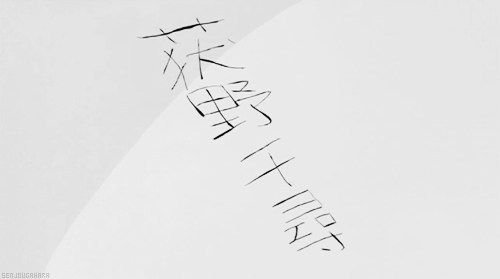
to take notes
google drive
notebook
grammar
imabi
guide to japanese
jgram
japanese test 4 you
puni puni japan
yes japan (japanese from zero)
japanese ammo
vocabulary
japanese test 4 you
mango languages
duolingo
memrise
puni puni japan
essential japanese kanji vol 1
japanese ammo
learn 101
i love languages
101 languages
language guide
my languages
i languages
culture
japanese ammo
reading
bilingual manga (yotsuba&)
mangaz
bookwalker
comico
mangabox
comic walker
writing
learning japanese hiragana and katakana workbook
mango languages
listening
netflix
anime lab
anime planet
reference
tangorin
textbooks
genki (beginner)
basic japanese
tumblr blogs
@learnjp
@japanesetest4you
@studying-conversation
@learnjapanesebod
@qkv-japanesevocab
@japanese-with-anime
@master3languages
@punipunijapan
@kokoninihongogaarimasu
youtube channels
learn japanese from zero! - grammar, culture, vocabulary
japanese ammo with misa - grammar, culture, vocabulary
learn japanese - grammar, culture, vocabulary
learn japanese 123 video - grammar, vocabulary
puni puni japan - grammar, vocabulary
japanese with hanako - grammar, vocabulary
that japanese man yuta - culture
learn japanese from some guy - grammar, vocabulary
kemushi chan - culture
ask japanese - culture
rachel and jun - culture
apps
hello talk - apple / android
duolingo - apple / android
drops - apple / android
memrise - apple / android
mango languages - apple / android
beelinguapp - apple / android
italki - apple / android
hinative - apple / android
lingodeer - apple / android
3K notes
·
View notes
Photo

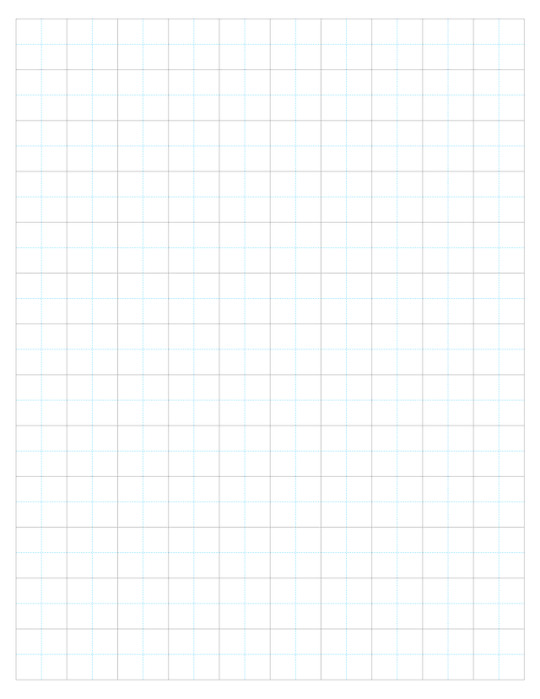
みんな、おはよう!
I made these printable grid sheets for my own use, and thought I would share them here!
I couldn’t find grid paper that had interior lines in different colors, so I made my own. (I chose a light blue color for contrast without being too distracting.) I made these in Photoshop, and then saved them as images. Then, I printed them to PDF files. These are standard U.S. legal size (8.5″ x 11″) sheets, but Tumblr shrunk them slightly.
The download links below will direct you to the PDF versions of these sheets (which are 8.5″ x 11″). They are hosted on my Dropbox account. I hope these help you with writing practice! (I actually printed 1 of each and had them laminated so I could write on them with a dry erase marker and re-use them!)
If you have any suggestions for more printables, feel free to let me know! ^_^
DOWNLOAD:
5 mm grid paper: Dropbox
10 mm grid paper: Dropbox
600 notes
·
View notes
Photo

今日のチャレンジイはイメージを書き表すのことです。 これは僕の猫の古い写真ですよ。 ここに毛布が2つある。オレンジと青いです。 そして, 毛布の上に言葉がある。 この猫はちょっと太いですけどめちゃかわいいね! 猫は緑目があるで, 茶色毛皮です。 大好きだよ! Challenge: @therealpolyglot
#language level up challenge#日本語勉強#日本語#langblr#japanese study#original#i hope you dont mind im @ing you for these
6 notes
·
View notes
Photo
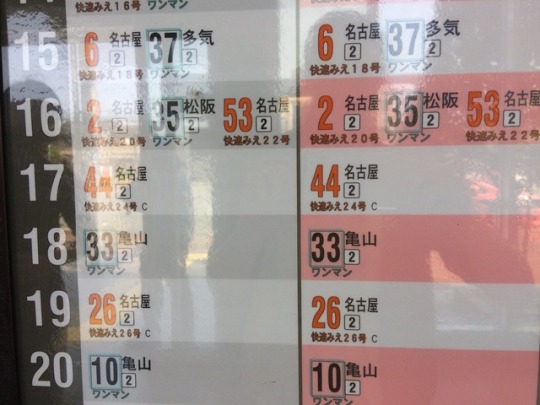
〜時(とき)・ when…
This is about the use of 〜時 as a suffix to mean “when…” in a dependent clause. The construction is simple (but usage can get tricky).
Before 時, use a verb in plain form, a 〜い or 〜な adjective, or a noun + の. (You can add a に after 時/とき. It’s optional and, when used, puts the emphasis on time/that time.)
Vう / た / たい… + 時(に)
Adj.い / かった + 時(に)
Adj. + な / だった + 時(に)
N. + の / だった + 時(に)
A few examples:
With a verb:
この映画を観た時、私は眠れない。
(この えいがを みた とき、わたしは ねむれない)
When I watch this movie, I can’t sleep.
通りを渡る時に気をつけて。
(とおりを わたる ときに きを つけて)
Be careful when you cross the street.
彼女は外へ行く時手袋をします。
(かのじょは そとへ いく とき てぶくろを します)
She wears gloves when she goes outside.
あなたは考えたいときにどこに行きますか?
(あなたは かんがえたい ときに どこに いきますか?)
Where do you go when you want to think?
With an adjective:
母はイチゴが安い時にたくさん買っておいた。
(ははは いちごが やすい ときに たくさん かっておいた)
My mother bought a lot of strawberries when they were cheap.
暇な時に私と一緒にランチに行きましょう。
(ひまな ときに わたしと いっしょに らんちに いきましょう)
Let’s have lunch together when you are free.
With a noun:
学生の時よく勉強しました。
(がくせいの とき よく べんきょうしました)
I studied hard when I was a student.
Notes (here’s the slightly tricky part, imo):
1) If the subject of the 〜時 clause is different from the main clause, use が.
私が高校生だった時父は海外で働きました。
(わたしがこうこうせいだったときちちはかいがいではたらきました)
When I was in high school, my father worked abroad.
2) If the verb before 時 (i.e. in the dependent clause) expresses a state and the main clause is in past tense, then the verb before 時 can be either past or non-past. (There can be nuances, but—yeah.)
私は日本にいる/いた時彼女に会った。
(わたしは にほんに いる/いた とき かのじょうに あった)
I met her when I was in Japan.
寂しい/寂しかった時この音楽を聞きました。
(さびしい/さびしかった とき この おんがくを ききました)
When I felt lonely, I listened to this music.
3) When the verb before 時 (i.e. in the dependent clause) expresses an action or movement, the meaning of the sentence changes depending on the tense you use. (The thing to keep in mind is that you have to read the tense before 時 in relation to the tense of the main clause.)
日本に行く時、日本語を勉強しました。
Before going to Japan, I studied Japanese.
日本に行った時、日本語を勉強しました。
When I went to Japan, I studied Japanese.
日本に行く時、日本語を勉強します。
Before going to Japan, I’m going to study Japanese.
日本に行った時、日本語を勉強します。
When I go to Japan, I’m going to study Japanese.
A/N: I’m just starting to wrap my head around this (in other words, trying to learn this expression correctly instead of using it haphazardly), so if anyone wants to help clarify, you’re very welcome!
373 notes
·
View notes
Text
im gonna start queuing reblogs ive had saved for a while~
1 note
·
View note
Text
hey!! i need more studyblrs to follow so reblog this if you post:
studyblr aesthetics
japanese
history/art history
culture studies
italian
university studyblr
thank you!
44 notes
·
View notes
Text
Good evening! Challenge day 3 entails finding 10 cognates, aka, words in Japanese that sound the same and mean the same thing as in English! Of course, some of them are slightly different due to the language, but i believe it still counts!
さあ、始めましょう!
1.イメージ - image
2.ジュース - juice
3.エレベーター - elevator
4.ドラマ - (tv) drama
5.ホテル - hotel
6.カメラ - camera
7.カレンダー - calendar
8.ガラス - glass
9.テレビ - televi(sion)
10.マッチ - match
Challenge: @therealpolyglot
6 notes
·
View notes
Text
こんばんは!今日のLEVEL UP CHALLENGEは。。。音楽を覚えるのことですよ!
だから、ヨルシカの言って勉強します。
それで、始めましょう!
*Given this is my first time fully translating a song, theres some things im unsure about. I put a lot of things i was having trouble with at the endnotes. If anyone wants to take a look and help me out, id really appreciate it!
言って
Say It
あのね、
hey,
私実は気付いてるの
to tell you the truth, I've already started to realize
ほら、君がいったこと
you see, about that thing you said
あまり考えたいと思えなくて忘れてたんだけど
I didn't really feel like thinking about it and I forgot but
盲目的に盲動的に妄想的に生きて
living blindly, rashly, delusionally
衝動的な焦燥的な消極的なままじゃ駄目だったんだ
and impulsively, impatiently, and negatively that way didn't do me any good
きっと、人生最後の日を前に思うのだろう
surely, when I think before the last day of my life
全部、全部言い足りなくて惜しいけど
it wouldn't be enough to say that everything, everything was precious, but
あぁ、いつか人生最後の日、君がいないことを
ah, on the last day of my life, you won't be here
もっと、もっと、もっと
more, more, more
もっと、ちゃんと言って
more, clearly say it
あのね、空が青いのって
hey, i don't know how to convey to you
どうやって伝えればいいんだろうね
that the sky is blue
夜の雲が高いのって
i don't know how to make you understand
どうすれば君もわかるんだろう
that nighttime clouds are long
言って
say it
あのね、私実はわかってるの
hey, to tell you the truth i understand
もう君が逝ったこと
that you're already gone
あのね、わからず屋って言うんだろうね
hey, you're probably calling me an idiot right?
忘れたいんだけど
i want to forget it but
もっとちゃんと言ってよ
say it more clearly
忘れないようメモにしてよ
write it down so you don't forget it
明日十時にホームで待ち合わせとかしよう
meet me on the platform tomorrow at 10 or something like that
牡丹は散っても花だ
a peony that scatters is still a flower
夏が去っても追慕は切だ
even if summer passes it's still earnestly yearned for
口に出して
say it with your mouth
声に出して
say it with your voice
君が言って
it's you who has to
そして人生最後の日、君が見えるのなら
and if I can see you on the last day of my life
きっと、人生最後の日も愛をうたうのだろう
surely, on the last day of my life too, ill sing of love
全部、全部無駄じゃなかったって言うから
because you say that everything, everything, wasn't all a waste
あぁ、いつか人生最後の日、君がいないことがまだ信じられないけど
ah, I still can't believe you won't be here on the last day of my life but,
もっと、もっと、もっと、もっと
more, more, more, more
もっと、もっと、もっと、君が
more, more, more, it's you who has to
もっと、もっと、もっと、もっと
more, more, more, more
もっと、ちゃんと言って
more, clearly say it
Unsure Sentences:
きっと、人生最後の日を前に思うのだろう
*only really because im not completely sure how 前に works here
あのね、わからず屋って言うんだろうね
not,,, completely sure what to translate this to. especially in a way that sounds eloquent
全部、全部言い足りなくて惜しいけど
this whole thing was basically guesswork + me vaguely remembering the old english translation i read for this song a long time ago. i sort of get 言い足りなくて means “saying isnt enough”. but 惜しい meaning both “precious” and “regrettable” is a doozy. On top of that, i dont entirely get the grammar being used here, so if anyone has an explanation thatd be great.
牡丹は散っても花だ
I think i get what this means, even if my phrasing could be better. But actually, i wanted to make a note because i remember in another yorushika song “petals falling” is in reference to a young life ending. so i think here its saying like, “even if you die young, you still have worth.” or something like that.
夏が去っても追慕は切だ
i feel like theres a lot of ways to translate this and im not sure which ones the best/which makes the most sense >.>
あのね、わからず屋って言うんだろうね
全部、全部無駄じゃなかったって言うから
to me, its unclear who is saying this here, but since im guessing it wouldnt be quoted if its the singer, and the only other character is “you”, i decided to go with my gut and hope for the best
also,,, these could be interpreted as future tense >.>;;;;
New words / words i don't remember well:
気づく・ 気付く - きづく - to notice, to realize
盲目的(に) - もうもくてき(に) - blind (trust, devotion, ect)
盲動的 - もうどう・ぼうどう acting rashly
妄想 - もうそう - delusion
衝動的 - しょうどうてき - impulsive
焦燥 - しょうそう - impatient
消極的 - negative, unmotivated, passive (???)
的 - てき -like, typical
惜しい - regrettable / precious (???)
伝える - つたえる - to convey, to communicate
待ち合わせ - まちあわせ - appointment
ホーム - train platform
牡丹 - ぼたん - peony
散る - ちる - to fall (blossoms, leaves)
去る - さる - to leave / to pass, to elapse
追慕 - ついぼ - cherishing the memory of, yearned for
切 - せつ - eagerly, earnestly
無駄 - むだ - futility, a waste
信じられない - しんじられない - unbelievable
わからず屋 - わからずや -blockhead
That took,,,, way longer to translate than i thought it would! I dont do a lot of japanese typing on my computer, so that doesnt help much either. Anyways, theres another “learn the lyrics to a song” day in this challenge later on, so i think im gonna use that to come back to this. My initial plan was to translate to get a good understanding and then memorize the lyrics, but i just dont have the time or energy today :( anyways! thanks for any help anyone can give me on this! and thank YOU for reading!
Challenge by: @therealpolyglot
#japanese#langblr#nihongo#level up language challenge#studyblr#long post#original#edit: went back and changed a few tiny things
21 notes
·
View notes